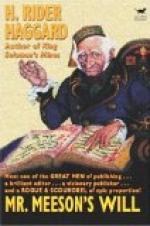The President: Well, I think that that will do. The Court is necessarily adverse to allowing the presumption of death, except on evidence of the most satisfactory nature. Still, considering that nearly four months have now passed since the foundering of the Kangaroo under circumstances which make it exceedingly improbable that there were any other survivors, I think that it may fairly presume that Mr. Meeson shared the fate of the other passengers.
Mr. Fiddlestick: The death to be presumed from the 18th of December.
The President: Yes, from the eighteenth.
Mr. Fiddlestick: If your Lordship pleases.
* * * * *
Augusta put down the paper with a gasp. There was she, safe and sound, with the true last will of Mr. Meeson tattooed upon her; and “probate had issued”—whatever that mysterious formula might mean—to another will, not the real last will. It meant (as she in her ignorance supposed) that her will was no good, that she had endured that abominable tattooing to no purpose, and was, to no purpose, scarred for life.
It was too much; and, in a fit of vexation, she flung the Times out of the window, and cast herself back on the cushion, feeling very much inclined to cry.
CHAPTER XIII.
EUSTACE BUYS A PAPER.
In due course the train that bore Augusta and her fortunes, timed to reach Waterloo at 5.40 p.m., rolled into the station. The train was a fast one, but the telegraph had been faster. All the evening papers had come out with accounts, more or less accurate, of their escape, and most of them had added that the two survivors would reach Waterloo by the 5.40 train. The consequence was, that when the train drew up at the platform, Augusta, on looking out, was horrified to see a dense mass of human beings being kept in check by a line of policemen.
However, the guard was holding the door open, so there was nothing for it but to get out, which she did, taking Dick by the hand, a proceeding that necessarily put her identity beyond a doubt. The moment she got her foot on to the platform, the crowd saw her, and there arose such a tremendous shout of welcome that she very nearly took refuge again in the carriage. For a moment she stood hesitating, and the crowd, seeing how sweet and beautiful she was (for the three months of sea air had made her stouter and even more lovely), cheered again with that peculiar enthusiasm which a discerning public always shows for a pretty face. But even while she stood bewildered on the platform she heard a loud “Make way—make way there!” and saw the multitude being divided by a little knot of officials, who were escorting somebody dressed in widow’s weeds.
In another second there was a cry of joy, and a sweet, pale faced little lady had run at the child Dick, and was hugging him against her heart, and sobbing and laughing both at once.




